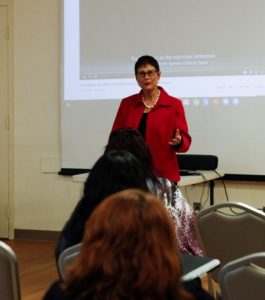
by Carol Leish
On January 21, 2020, at The Ventura Avenue Adult Center, the Ventura Council on Senior’s chair, Suz Montgomery, said that, ‘The importance of doing this talk about dementia and Alzheimer’s within our community is essential, since we need to find ways to improve things for those, who are affected, in order for them to be able to live better lives. The issues of caregiving and transportation are also important topics for us to discuss.”
Teresa Valko, who is a Board Chair, at the Alzheimer’s Association, CA Central Coast Chapter, first mentioned that the difference between dementia and Alzheimer’s is, “Dementia is the umbrella diagnosis of memory loss/cognitive impairments that affect daily life in which 60-70% of the time is caused by Alzheimer’s.”
“By getting an assessment and diagnosis in the early stages,” according to, Valko, “People affected will be able to do some planning and to have a voice according to what their wishes/desires are.” She said that, “14,000 people in Ventura are living with Alzheimer’s, which is the 3rd leading cause of death in California, with no cure.” That’s why she mentioned that, “Funding for research is important, especially with no cure yet, since we are all paying taxes.” She said that many bills at the federal level seek to support caregivers.” Continued funding has put more money in research from top scientists through the world. “All researchers, from all over the world, are sharing their data, since everyone wants to see a change, and a cure.”
Teri Helton, MSN, Community Engagement Coordinator for Ventura County Caregivers: Volunteers Assisting the Elderly, focused on ways of managing common behaviors in dementia sufferers. She stressed that, ‘It is important to be understanding, and to offer support to those who are suffering.” She said that this includes, “Helping others by simplifying and organizing their daily routines and limiting distractions. Also, by empathizing and saying, ‘I see you’re frustrated. How can I help?’”
“Late stage challenges within people with dementia,” according to, Helton, “include, the ability to communicate, and possible trouble with sleeping.” She said that, ‘It’s essential to give slow and direct/compassionate statements, since emotions remain intact.” She said that by maintaining a regular routine, and by asking only one question at a time, others feel more comfortable with their particular situation.
Phil Chandler, MBA, Owner/President of Right at Home of Ventura County, is a Senior Advisor, focused on the importance of self-love for caregivers. He said, “It’s important to keep our loved ones safe, happy, and to keep them engaged.” He said that there are many support groups within Ventura County to help out caregivers of those with dementia. “Also, seeing a therapist or counselor might be helpful to those who are caregivers.”
Chandler also emphasized that, “It is very important to set up a legal Power of Attorney and do Estate Planning, if you’re over the age of 18, in order to be able to have a voice of how you want to be treated if you can’t voice it for yourself.”
According to Suz Montgomery, “It’s important to understand how to manage the maze of dementia and Alzheimer’s Disease, since it is a current crisis that we need to make a priority by finding treatments and cures in order to improve situations.”
